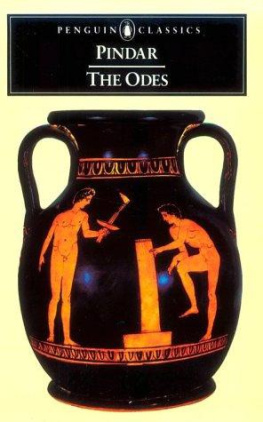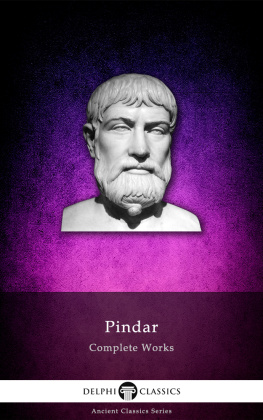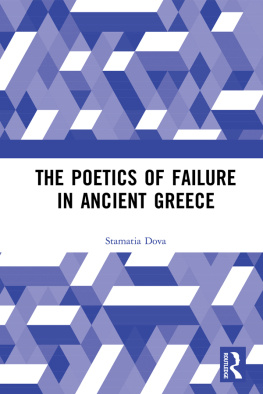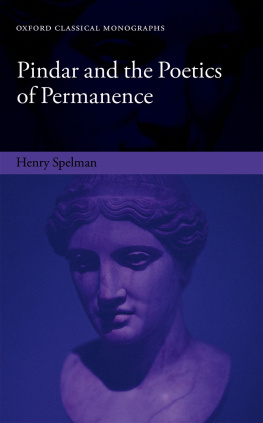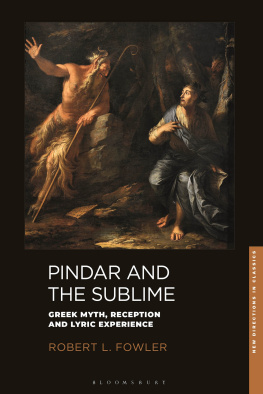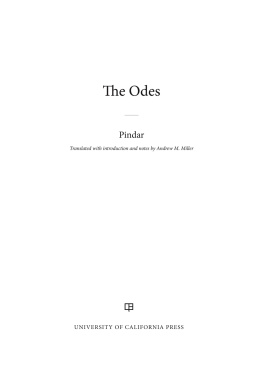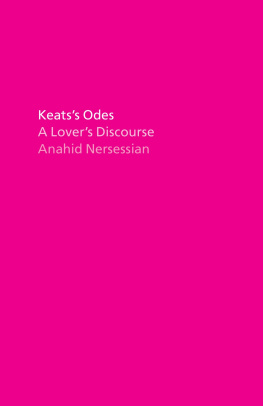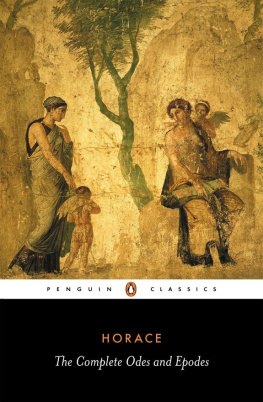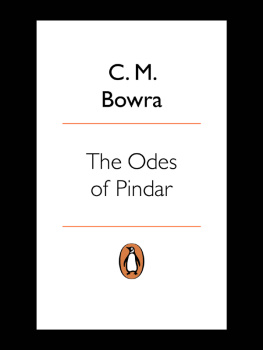OXFORD WORLDS CLASSICS
THE COMPLETE ODES
PINDAR lived in the Boeotian city of Thebes, about 40 miles northwest of Athens. Born in 518 BC (he died some time after 446) and a contemporary of the tragedian Aeschylus, he lived during the Persian Wars and subsequent growth of the Athenian empire, and was ranked in antiquity as Greeces greatest lyric poet. What we know about him is mostly derived from his poetry itself. He is most famous for his epinician or victory odes, composed for winners in the ancient athletics festivals and sung to music by a chorus. His patrons included the Sicilian tyrants Hieron I and Theron, Arcesilas IV king of Cyrene, Megacles uncle of Pericles, and a number of other wealthy and powerful families who commissioned odes from him, but he was on particularly friendly terms with victors from the island of Aegina, for whom a quarter of the forty-five surviving odes were written. He wrote many other poems, for both states and individuals, but all of these survive only in fragments.
ANTHONY VERITY was formerly Headmaster of Leeds Grammar School and Master of Dulwich College. In his retirement he acts as an educational consultant. He has translated Theocritus Idylls for Oxford Worlds Classics.
STEPHEN INSTONE is an Honorary Research Fellow at University College London.
OXFORD WORLDS CLASSICS
For over 100 years Oxford Worlds Classics have brought readers closer to the worlds great literature. Now with over 700 titlesfrom the 4,000-year-old myths of Mesopotamia to the twentieth centurys greatest novelsthe series makes available lesser-known as well as celebrated writing.
The pocket-sized hardbacks of the early years contained introductions by Virginia Woolf, T. S. Eliot, Graham Greene, and other literary figures which enriched the experience of reading. Today the series is recognized for its fine scholarship and reliability in texts that span world literature, drama and poetry, religion, philosophy, and politics. Each edition includes perceptive commentary and essential background information to meet the changing needs of readers.
Refer to the to navigate through the material in this Oxford Worlds Classics ebook. Use the asterisks (*) throughout the text to access the hyperlinked Explanatory Notes.
OXFORD WORLDS CLASSICS

PINDAR
The Complete Odes

Translated by
ANTHONY VERITY
With an Introduction and Notes by
STEPHEN INSTONE


Great Clarendon Street, Oxford OX2 6DP
Oxford University Press is a department of the University of Oxford.
It furthers the Universitys objective of excellence in research, scholarship,
and education by publishing worldwide in
Oxford New York
Auckland Cape Town Dar es Salaam Hong Kong Karachi
Kuala Lumpur Madrid Melbourne Mexico City Nairobi
New Delhi Shanghai Taipei Toronto
With offices in
Argentina Austria Brazil Chile Czech Republic France Greece
Guatemala Hungary Italy Japan Poland Portugal Singapore
South Korea Switzerland Thailand Turkey Ukraine Vietnam
Oxford is a registered trade mark of Oxford University Press
in the UK and in certain other countries
Published in the United States
by Oxford University Press Inc., New York
Translation Anthony Verity 2007
Editorial material Stephen Instone 2007
The moral rights of the authors have been asserted
Database right Oxford University Press (maker)
First published as an Oxford Worlds Classics paperback 2007
All rights reserved. No part of this publication may be reproduced, stored in a retrieval system, or transmitted, in any form or by any means, without the prior permission in writing of Oxford University Press, or as expressly permitted by law, or under terms agreed with the appropriate reprographics rights organization. Enquiries concerning reproduction outside the scope of the above should be sent to the Rights Department, Oxford University Press, at the address above
You must not circulate this book in any other binding or cover
and you must impose this same condition on any acquirer
British Library Cataloguing in Publication Data
Data available
Library of Congress Cataloging in Publication Data
Pindar.
[Works. English. 2007]
The complete odes / Pindar; translated by Anthony Verity; with an introduction
and notes by Stephen Instone.
p. cm. (Oxford worlds classics)
Includes bibliographical references.
ISBN13: 9780192805539 (alk. paper)
1. PindarTranslations into English. 2. Laudatory poetry, GreekTranslations into English.
3. AthleticsGreecePoetry. 4. GamesGreecePoetry. I. Verity, Anthony. II. Instone, Stephen. III. Title.
PA4275.E5P3 2007 885.0109dc22 2006039673
Typeset by Cepha Imaging Private Ltd., Bangalore, India
Printed in Great Britain
on acid-free paper by
Clays Ltd., St Ives plc
ISBN 9780192805539
1 3 5 7 9 10 8 6 4 2
CONTENTS
INTRODUCTION
Pindars Odes
The victory (epinician) odes of Pindar (518c. 438 BC) celebrate athletes victorious in the ancient games. Pindar did not invent this type of poetrythe lyric poets Ibycus (sixth century) and Simonides (c. 556466) had composed poems celebrating athletics victors, of which fragments survive;
Most, but not all, of the odes follow a typical pattern and contain standard ingredients: direct praise of the victor and his home town, general moralizing, a myth about gods and heroes that has been tailored to be relevant to the victor, something about the performance of the ode and the poet himself. The mythical section is often the main part of the ode, and Pindar liked if possible to draw on myths connected with the victors home town, some of which may have pre-existed as local stories. He was also influenced, both for myths and moral sentiments, by earlier epic poetry, especially Homers Iliad, Hesiod (not only his Theogony and Works and Days, which survive in their entirety, but also other now fragmentary Hesiodic poetry, for example Catalogue of Women and Precepts of Chiron) and the body of post-Homeric epic known as the epic cycle.
Pindar was paid for his victory odes, and several times alludes to the fact that the recipient of the ode is paying for the fame bestowed on him.
Pindar
Our main source for what we know about Pindar derives from what survives of his own poetry. But in it he often adopts a persona, so what he appears to say about himself has to be used with caution as biographical evidence. He came from near Thebes, in Boeotia, about 40 miles north-west of Athens, and birthplace of Heracles. In his odes he has a special affection for Heracles, as a proto-athlete from his home city. By and large he keeps his own political views out of the odes, tailoring his opinions to be acceptable to his clients. Even though Thebes and Athens did not always see eye to eye during his lifetime, Pindar still composed odes for Athenians and other poetry for Athens. Sparta gets numerous complimentary references, but this is often simply because it was the birthplace of the Dioscuri, Castor and Polydeuces, great mythological athletes; no ode is for a Spartan, no poem is for Sparta, whose austere environment was not attractive to Pindar. He preferred lavish hospitality, especially that of Aegina, an island south of Athens; on it was (and still is) a famous temple to Aphaea, an Aeginetan goddess similar to Artemis, rebuilt in the early fifth century. In the last sentence of
Next page

